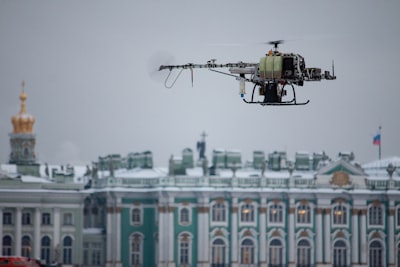Russian Drone Strikes on Kyiv: Examining the Latest Wave and What It Means for the Ukraine Conflict
The escalating Russian drone attacks on Kyiv are making global headlines, prompting questions about military tactics, international diplomacy, and the future of the war in Ukraine. As headlines report record-breaking salvos—with over 550 drones launched in a single night—tensions and anxieties are spiking both within Ukraine and across the globe.
Why Are Russian Drone Strikes Increasing in Ukraine?
The surge in Russian drone warfare is not random. Recent months have seen a strategic shift: Russia is deploying increasingly sophisticated, large-scale drone and missile barrages against key Ukrainian targets, notably infrastructure and population centers in Kyiv. These attacks serve multiple objectives:
- Testing and exhausting Ukrainian air defenses
- Disrupting daily life and demoralizing civilians
- Damaging critical infrastructure such as railways, schools, and embassies
- Sending political signals, particularly after failed diplomatic overtures (e.g., Trump-Putin truce discussions)
Impact on Civilians and Urban Infrastructure
Kyiv and other major Ukrainian cities, including Sumy, Kharkiv, and Chernihiv, face nightly fear as air raid alerts and explosions become routine. In addition to civilian injuries and deaths, the widespread destruction of buildings—schools, homes, government sites—amplifies the humanitarian crisis. Damaged railway infrastructure further impedes transportation and supply routes.
Diplomatic Fallout: Where Do Peace Talks Stand?
Drone attacks intensified immediately after a high-profile call between Donald Trump and Vladimir Putin, in which Trump expressed disappointment over Russia's refusal to consider a truce. The Kremlin and President Putin continue to insist on eliminating what they call "the root causes of war"—a stance Ukraine and Western allies see as evidence of Russia's expansionist aims.
President Zelensky and Ukrainian officials urge greater sanction pressure on Moscow and increased military support—especially continuation of U.S. weapons supplies, as any pause could severely undermine Ukraine's defensive capabilities.
The Evolving Role of Drones in Modern Warfare
Drones have redefined the frontlines of the Ukraine war, enabling persistent surveillance and cost-effective, long-range attacks. For Russia, mass drone assaults stretch Ukrainian air defenses thin. For Ukraine, mounting its own counter-drone attacks into Russian border regions demonstrates the mutual escalation of the conflict.
Key trends:
- Advancements in drone technology
- Increasing affordability and availability of weaponized drones
- The shift toward "swarm tactics" over traditional missile barrages
International Response: Sanctions, Aid, and Political Debates
The international community—particularly NATO allies and the U.S.—face heated debates over:
- The effectiveness and impact of sanctions against Russia
- Ongoing military aid and weapons shipments to Ukraine
- Balancing support for Ukraine with national stockpiles and readiness
Incidents such as damage to the Polish embassy in Kyiv underscore the growing regional risks and complications for neighboring countries.
What Does This Mean for the Future of Ukraine and Global Security?
As Russia shows little interest in negotiations and Ukraine calls for more robust military and diplomatic backing, the threat of further escalation looms large. The increased use of drones in large numbers could set new precedents for future conflicts worldwide. How the U.S., EU, and NATO respond may influence not only the outcome in Ukraine but also shape the evolving landscape of modern warfare.
FAQ: Russian Drone Attacks on Ukraine
Why is Russia using more drones in the war against Ukraine?
- Drones are harder to intercept, cheaper to deploy in large numbers, and can overwhelm defense systems.
What can civilians do during an air raid in Ukraine?
- Follow official alerts, seek shelter, and stay updated on guidance from authorities and emergency services.
How effective have sanctions been in curbing Russia's war efforts?
- Sanctions have imposed economic costs but have not stopped Russia's military operations so far.
Will Western aid to Ukraine continue?
- Aid remains under discussion in Europe and the U.S., with debates over national security and resource allocation ongoing.
For more on drone warfare, Russia-Ukraine relations, and international security, follow our coverage or visit credible sources like BBC News, Reuters, and NATO.

Comments
No comments yet. Be the first to comment!